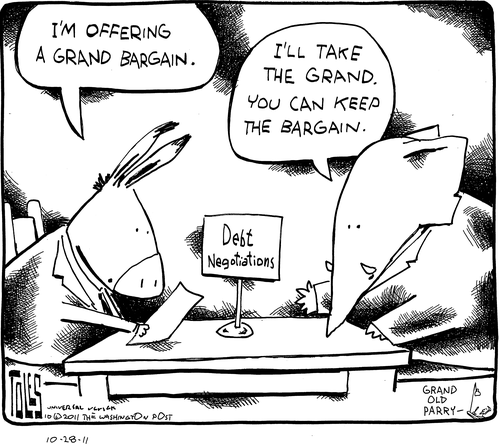The House of Representatives raised the debt ceiling by a vote of 269 to 161 and the bill moved to the Senate where it was expected to pass by unanimous consent passed by a vote of 72 – 26 and was signed into law by President Obama this afternoon. Besides raising the debt ceiling enough so that it won’t have to be considered again until 2013, well after the election, the bill contains budget cuts that will total over $2 trillion, part immediately, the rest over 10 years. The bill was called “a sugar coated satan’s sandwich” by Rep. Emanuel Cleaver (D-MO), chairman of the Congressional Black Caucus due to the rest of the bill’s proposals. House Speaker John Boehner spoke with the press gleefully stating that he got 98% of what he wanted. On the other side of the Capitol building, Senate Minority leader Mitch McConnell warning that there is more use of raw extortion as a negotiating tactic in the future:
The bill includes the creation of an equally split “super committee” that abrogates the right of congressional parliamentary prerogatives to debate or amend bills that arise from any agreement and if there is no agreement on cuts, then automatic across the board cuts that include Medicare and military spending. Keith Olbermann’s Special Comment eviscerates the bill’s flaws and the consequences.
Transcript:
I close, as promised, with a Special Comment on the debt deal.
Our government has now given up the concept of right and wrong.
We have, in this deal, declared that we hold these truths to be self-evident: that all political incumbents are created equal, that they are endowed by their creator with certain unalienable Rights, that among these are Re-nomination, re-election, and the pursuit of hypocrisy.
We have, in this deal, gone from the Four Freedoms to the Four Great Hypocrisies.
We have superceded Congress to facilitate 750 billion dollars in domestic cuts including Medicare in order to end an artificially-induced political hostage crisis over debt, originating from the bills run up by a Republican president who funneled billions of taxpayer dollars to the military-industrial complex by unfunded, unnecessary, and unproductive wars, enabled in doing so by the very same Republican leaders who now cry for balanced budgets – and we have called it compromise. And those who defend it have called it a credit to a pragmatic president who wins some sort of political “points” because, having stood for almost nothing here, he gave away almost nothing for which he stood.
It would be comical if it were not tragic.
Either way, it is a signal moment in our history, in which both parties have agreed and codified that the political structure of this nation shall now based entirely on hypocrisy and political self-perpetuation.
Let us start with the first of the Great Hypocrisies: The Committee. The Republican dogs can run back to their corporate masters and say they have forced one-and-one-half trillion dollars in cuts and palmed off the responsibility for them on this nonsensical “Super Congress” committee.
For two-and-a-half brutal years we have listened to these Tea Party mountebanks screech about the Constitution of the United States as if it were the revealed word and not the product of other – albeit far better – politicians. They demand the repeal of Amendments they don’t like, and the strict interpretation of the ones they do, and the specific citation of authorization within the Constitution for every proposed act or expenditure or legislation.
Except this one.
Where does it say in the Constitution that the two houses of Congress can, in effect, create a third house to do its dirty work for it; to sacrifice a few Congressmen and Senators so the vast majority of incumbents can tell the voters they had nothing to do with this?
This leads to the second of the Great Hypocrisies: how, in the same breath, the Republicans can create an extra-Constitutional “Super Congress” and yet also demand a Constitutional Amendment to force the economic stupidity that would be a mandated balanced budget. Firstly: pick a side! Ignore the Constitution or adhere to it.
Firstly, pick a side, ignore the constitution or adhere to it. And of what value would this Mandated Balanced Budget be? Our own history proves that at a time of economic crisis, if the businesses aren’t spending, and the consumers aren’t spending, the government must. Our ancestors were the lab rats in the horrible experiments of the Hoover Administration that brought on the Great Depression, in which the government curled up into a ball while it simultaneously insisted the economy should heal itself, when, in times of crisis – then and now – the economy turns out to be comprised entirely of a bunch of rich people who will sit on their money no matter if the country starves.
Forgotten in the Republican Voodoo dance, dressed in the skins of the mythical Balanced Budget, triumphant over the severed head of short-term retrenchment that they can hold up to their moronic followers, are the long-term implications of the mandated Balanced Budget.
What happens if there’s ever another… war?
Or another… terrorist attack?
Or another… naturaldisaster?
Or any other emergency that requires A government to spend a dollar morethan it has? A Constitutional Amendment denying us the right to run a deficit, is madness, and it will be tested by catastrophe sooner than any of its authors with their under-developed imaginations that can count only contributions and votes, can contemplate.
And the third of the Great Hypocrisies is hidden inside the shell game that is the Super Congress. TheSuper Congress is supposed to cut evenly from domestic and defense spending, but if it cannot agree on those cuts, or Congress will not endorse them, there will be a “trigger” that automatically cuts a trillion-two or more – but those cuts will not necessarily come evenly from the Pentagon. We are presented with an agreement that seems to guarantee the gutting of every local sacred cow from the Defense Department. Except if the Congressmen and Senators to whom the cows are sacred, disagree, and overrule, or sabotage the Super Congress, or, except if for some reason a 12-member Committee split evenly along party lines can’t manage to avoid finishing every damned vote 6-to-6.
We’re cutting Defense. Unless we’re not.
The fourth of the Great Hypocrisies is the evident agreement to not add any revenues to the process of cutting. Not only is the impetus to make human budget sacrifices out of thepoor and dependent formalized… but the rich and the corporations are thus indemnified, again, and given more money not merely to spend on themselves and their own luxuries, but more vitally, they are given more money to spend on buying politicians, and legislatures, and courts, buying entire states, all of which can be directed like so many weapons, in the service of one cause and one cause alone: making bystatute and ruling, the further protection of the wealthy at the expense ofeverybody else, untouchable, inviolable – permanent.
The White House today boasted of loopholes to be closed and tax breaks to be rescinded — later.
By a committee.
A committee that has yet to be formed.
There are no new taxes. Except the stealth ones, enacted on 99 out of 100 Americans by this evil transaction. Every dollar cut from the Safety Net is another dollar added to the citizen’s cost for education, for security, for health, for life itself. It is another dollar he can’t spend on making a better life for himself, or atleast his children. It is another dollar he must spend instead on simply keeping himself alive.
Where is the outrage over these Great Hypocrisies? Do you expect it to come from a corrupt and corrupted media, for whom access is of greater importance than criticizing the failure of a political party or defending those who don’t buy newspapers or can’t leapwebsite paywalls or could not afford cable tv?
Do you expect it to comefrom a cynical and manipulative political structure? Do you expect it from those elected officials who no longer know anything of government or governance, but only perceive how to get elected, or how to pose in front of a camera and pretend to be leaders? Do you expect it from politicians themselves, who will merely calculate whether or not it’s right based on whether or not it will get them more contributions?
Do you expect it will come from the great middle ground of this country, with a population obsessed with entertainment, video games, socialmedia, sports, and trivia?
Where is the outrage to come from?
From you!
It will do no good to wait for the politicians to suddenly atone for their sins. They are too busy trying to keep their jobs, to do their jobs.
It will do no good to wait for the media to suddenly remember its origins as the ‘free press,’ the watchdog of democracy envisioned by Jefferson. They are too busy trying to get exclusive DETAILS about exactly how the bankrobbers emptied the public’s pockets, to give a damn about telling anybody what they looked like, or which way they went.
It will do no good to wait for the apolitical public to get a clue. They can’t hear the clue through all the chatter and scandal and diversion and delusion and illusion.
The betrayal of what this nation is supposed to be about did not begin with this deal and it surely will not end with this deal. There is a tide pushing back the rights of each of us, and it has been artificially induced by union-bashing and the sowing ofhatreds and fears, and now this ever-more-institutionalized economic battering of the average American. It will continue, and it will crush us, because those who created it are organized and unified and hell-bent.
And the only response is to be organized and unified and hell-bent in return. We must find again the energy and the purpose of the 1960’s and early 1970’s and we must protest this deal and all the God damn deals to come, in the streets. We must arise, non-violently but insistently. General strikes, boycotts, protests, sit-ins, non-cooperation take-overs – but modern versions of that resistance, facilitated and amplified, by a weapon our predecessors did not have: the glory that is instantaneous communication.
It is from an old and almost clichéd motion picture that the wisdom comes: First, you’ve got to get mad.
I cannot say to you, meethere or there at this hour or that one, and we will peacefully break the back of government that now exists merely to get its functionaries re-elected. But I can say that the time is coming when the window for us to restore the control of our government to our selves will close, and we had damn well better act before then.
Because this deal is more than a tipping point in which the government goes from defending the safety net to gutting it. This is wrong, and while our government has now declared that it has given up the concept of right-and-wrong, you and I… have not, and will not, do so.
Good night, and good luck.

 The deadline for the bicameral Super Committee to come up with a deal on deficit reduction is a week away. While many
The deadline for the bicameral Super Committee to come up with a deal on deficit reduction is a week away. While many  Scarecrow at
Scarecrow at  Yes, we are still playing and the Republicans have the advantage. So far they have won 98% of everything they asked for and are still holding hostages. The new extra-constitutional super committee of 12 will start work on the next round of hostage negotiations. Composed equally of Democrats and Republicans, three of each from the Senate and the House, the committee is tasked with finding $1.2 trillion in deficit cuts. Here are the members that have been selected by the leadership:
Yes, we are still playing and the Republicans have the advantage. So far they have won 98% of everything they asked for and are still holding hostages. The new extra-constitutional super committee of 12 will start work on the next round of hostage negotiations. Composed equally of Democrats and Republicans, three of each from the Senate and the House, the committee is tasked with finding $1.2 trillion in deficit cuts. Here are the members that have been selected by the leadership:
Recent Comments